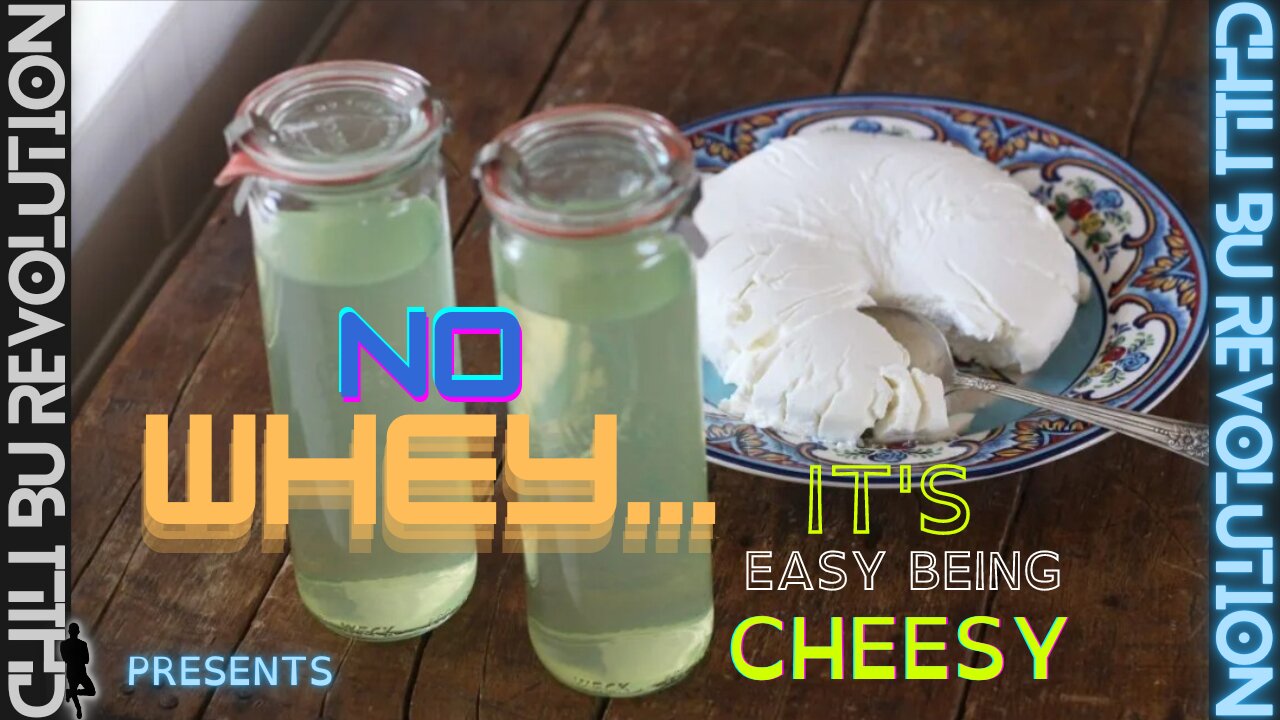Premium Only Content

No Whey...it's easy being cheesy! (for Laura)
Whey is a superfood
Don’t throw out your kefir if it separates into whey and curds. Your whey, although less appealing to many individuals, is a superfood which contains a lot of healing properties. There is something known as “The Whey Cure” which was used throughout history. In fact, Hippocrates and Galen, two founding fathers of medicine, frequently recommended whey to their patients to heal them. This whey was often referred to as “liquid gold.”
Powerful antimicrobial and anti-inflammatory properties
Whey has a lot of protein. One of these proteins, Lactoferrin, acts as a powerful antimicrobial and anti-inflammatory. It also contains vitamin B2, or riboflavin, which helps the body to convert carbohydrates into fuel. Bovine Serum Albumin, which is abundant in whey, is an amino acid that is an effective scavenger that removes toxic substances, supports white blood cells, and helps maintain healthy cholesterol levels.
Assists the kidneys and liver
The curds (the cheese) portion of kefir contains most of the fat, casein, and vitamin A, but whey also contains a lot of beneficial properties and they both contain probiotics. Since most of the lactose is gone and the whey portion is 93 percent water, whey (which is rich in potassium) can help balance and remove excess fluids in the body and remove toxins. The kidneys filter wastes and toxins out of the blood and eliminate them in the urine. The kidneys are constantly working and when they become overburdened, the excess toxins can collect in the body and form diseases such as gout, rheumatism, osteoarthritis, and some forms of eczema. Drinking kefir, and especially the whey, will assist the kidneys and liver in the elimination of toxins.
99% lactose free
The good lactic acid bacteria in kefir eat the lactose (milk sugars) out of the milk, lower the pH, make it tart, and cause the milk protein to thicken. The digestion of the lactose in milk when these bacteria ferment milk makes kefir easily digestible. Kefir is considered a pre-digested food. The bacteria make probiotics from the sugars and also make it 99% lactose free. If it does it quickly, because of higher temperatures or too many grains per the amount of milk, the kefir will separate into whey and curds.
Casein in Kefir
Casein is the protein that causes "curds" to form when the milk sours. If there is any casein in the whey, it would be very minimal, but most likely none. Casein is mostly in the cheese part. If you're making kefir cheese by separating the whey from the curds, and you let it ferment longer in the fridge, it too will most likely break down the casein. You want the casein to be present in the milk to form the curd in kefir, but the microbes will also break it down so you can digest it, which is a wonderful by-product of fermentation.
Nutritional Information:
Carbohydrates, Fats, And Proteins
When you make kefir cheese, the whey has most of the carbs and the cheese has most of the protein.
So the breakdown goes like this: based on 1 cup of fat-free milk; the whey contains 83% carbs; 3% fat; and 14% protein.
The whey liquid is carbohydrates in the form of lactose or milk sugar. A 1-cup serving of regular whey contains nearly 12.6 g of carbs, accounting for three-fourths of its roughly 67 calories The other calories are from Fat 0.9, and Protein 2.1.
Now, this changes through lactic acid fermentation significantly lowering the carbohydrates depending on how long it is fermented.
During the process of fermentation, microorganisms such as bacteria and yeast convert organic compounds – such as sugars and starch – into small amounts of alcohol or acids.
For example, much of the starches and sugars in milk kefir, cultured vegetables, and kombucha tea are converted to lactic acid and this lactic acid acts as a natural preservative keeping out pathogens and foodborne illness.
Lactic acid is an organic molecule. Its chemical formula is C3H6O3. Lactic acid has the same proportion of carbon, hydrogen, and oxygen as carbohydrates but it is technically not a carbohydrate.
One cup of kefir cheese made with non-fat milk has roughly 30 calories: 1 gram of fat, 3.5 grams of protein, and 1-2 carbohydrates. This can change based on the length of fermentation and the type of milk you use.
One cup of kefir whey made with non-fat milk has roughly 37 calories: 1 gram of fat, 2 grams of protein, and 5 carbohydrates. This can change based on the length of fermentation and the type of milk you use.
Kefir is considered 99 % lactose-free since the milk sugars are significantly lowered to 1-3 carbs per cup serving. This is why you get a sour taste - the milk sugars are lowered through lactic acid fermentation.
-
 3:17
3:17
Mind, Body & Soul
8 months agoWe've Got Your Back!
461 -
 LIVE
LIVE
Nerdrotic
1 hour agoMysteries of 3I/ATLAS | Forbidden Frontier #113
391 watching -
 11:52
11:52
Exploring With Nug
33 minutes agoWhat’s Hiding Under This Dallas Lake We Found a Vehicle!
654 -
 LIVE
LIVE
Barry Cunningham
6 hours agoBREAKING NEWS: PRESIDENT TRUMP SET TO TAKEOVER CHICAGO AND BOSTON!
2,137 watching -
 LIVE
LIVE
SpartakusLIVE
1 hour agoThe BADDEST Duo in WZ Exhibits PEAK Physique || Duos w/ Sophiesnazz to start, quads later
669 watching -
 LIVE
LIVE
LumpyPotatoX2
1 hour agoSunday Funday on HellDivers - #RumbleGaming
97 watching -
 3:11:52
3:11:52
Esports Awards
4 hours agoEsports Awards: Decade Awards 2025
41.2K3 -
 1:02:58
1:02:58
Sarah Westall
2 hours agoMILITARY WHISTLEBLOWER: How Social Media Military Level Psyops are Manipulating You w/ Patrick Bergy
6.03K3 -
 30:41
30:41
Stephen Gardner
1 hour ago🔥WHITE HOUSE GETS UNEXPECTED BIG WIN!
10.4K10 -
 9:39
9:39
MattMorseTV
3 hours ago $0.31 earnedVance just DROPPED a BOMBSHELL.
10.4K40